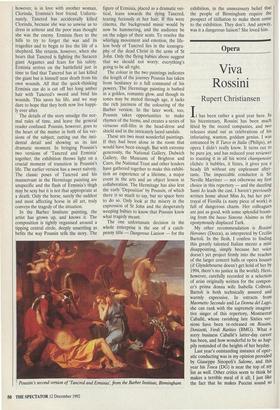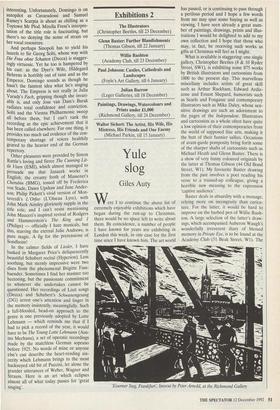Opera
Viva Rossini
Rupert Christiansen
It has been rather a good year here. In his bicentenary, Rossini has been much feted by the record companies, and two releases stand out as celebrations of his infuriating, wanton, goddam genius. I was entranced by Il Turco in Italia (Philips), an opera I didn't really know. It turns out to be pure joy, and has reduced your reviewer to toasting it in all his worst champenoise clichés: it bubbles, it fizzes, it gives you a heady lift without any unpleasant after- taste. The impeccable conductor is Sir Neville Marriner — not otherwise my first choice in this repertory — and the dazzling Sumi Jo leads the cast. I haven't previously written home about Miss Jo, but her por- trayal of Fiorilla (a nasty piece of work) is full of dangerous charm. Her colleagues are just as good, with some splendid boom- ing from the basso Simone Alaimo as the eponymously displaced Turk. My other recommendation is Rossini Heroines (Decca), as interpreted by Cecilia Bartoli. In the flesh, I confess to finding this greatly talented Italian mezzo a mite disappointing, simply because her voice doesn't yet project firmly into the reaches of the larger concert halls or opera houses (if Glyndebourne doesn't get hold of her by 1994, there's no justice in the world). Here, however, carefully recorded in a selection of arias originally written for the compos- er's prima donna wife Isabella Colbran, Bartoli is both technically assured and warmly expressive. In extracts from Maometto Secondo and La Donna del Lago, she can rank with the supremely imagina- tive singer of this repertory, Montserrat Caballe, whose ravishing late Sixties ver- sions have been re-released on Rossini, Donizetti, Verdi Rarities (BMG). What a sorry business Caballe's latter-day career has been, and how wonderful to be so hap- pily reminded of the heights of her heyday.
Last year's outstanding instance of oper- atic conducting was in my opinion provided by Giuseppe Sinopoli's Salome, and this year his Tosca (DG) is near the top of my list as well. Other critics seem to think he makes a terrible meal of it all; I just like the fact that he makes Puccini sound so
interesting. Unfortunately, Domingo is on autopilot as Cavaradossi and Samuel Ramey's Scarpia is about as chilling as a Toytown Mr Plod. Mirella Freni's interpre- tation of the title role is fascinating, but there's no denying the sense of strain on her vocal resources.
And perhaps Sinopoli has to yield his laurels to Sir Georg Solti, whose way with Die Frau ohne Schatten (Decca) is stagger- ingly virtuosic. Yet he too is hampered by his cast: as the Dyer's Wife, Hildegard Behrens is hofribly out of tune and as the Emperor, Domingo sounds as though he hasn't the faintest idea what he's singing about. The Empress is not really in Julia Varady's Fach, gripping though she invari- ably is, and only Jose van Dam's Barak radiates total confidence and conviction. Solti and the Vienna Philharmonic sweep all before them, but I can't rank the recording as the epic achievement that it has been called elsewhere. For one thing, it provides too much sad evidence of the con- temporary shortage of voices healthily geared to the heavier end of the German repertory. Other pleasures were provided by Simon Rattle's loving and fierce The Cunning Lit- tle Vixen (EMI), which almost managed to persuade me that Janacek works in English; the creamy froth of Massenet's Cherubin (BMG), tossed off by Frederica von Stade, Dawn Upshaw and June Ander- son; Philip Pickett's vivid version of Mon- teverdi's L'Orfeo (L'Oiseau Lyre), with John Mark Ainsley gloriously supple in the title role; and I can't resist mentioning John Mauceri's inspired revival of Rodgers and Hammerstein's The King and I (Philips) — officially I hate musicals, but this, starring the eternal Julie Andrews, is pure magic. A fig for the pretensions of Sondheim!
In the calmer fields of Lieder, I have basked in Margaret Price's deliquescently beautiful Schubert recital (Hyperion). Less soothing, but sternly impressive were two discs from the phenomenal Brigitte Fass- baender. Sometimes I find her manner too hectoring, but the passionate commitment to whatever she undertakes cannot be questioned. Her recordings of Liszt songs (Decca) and Schubert's Schwanengesang (DG) arrest one's attention and linger in the memory insistently, meaningfully. Such a full-blooded, head-on approach to the genre is one previously adopted by Lotte Lehmann — which reminds me that if I had to pick a record of the year, it would have to be The Young Lotte Lehmann (Aus- tro Mechana), a set of operatic recordings made by the matchless German soprano before 1925. No words of mine or anyone else's can describe the heart-rending sin- cerity which Lehmann brings to the most hackneyed old bit of Puccini, let alone the grander utterances of Weber, Wagner and Strauss. Here is an art which eclipses almost all of what today passes for 'great singing'.



































































 Previous page
Previous page